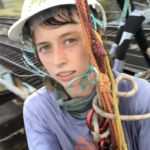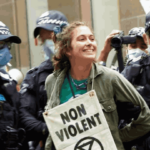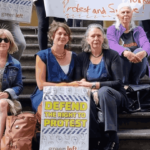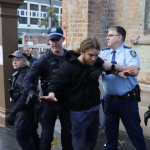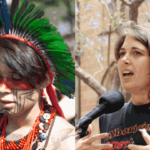Climate Defender on Trial for Refusal to Disclose Device Passwords: Disrupt Burrup Hub’s Joana Partyka

National attention was drawn to the destructive nature of Woodside’s Burrup Hub project when Joana Partyka and a fellow Disrupt Burrup Hub activist defaced, but didn’t permanently damage, the famous Australian painting Down on His Luck at the Art Gallery of WA in January this year.
Partyka subsequently pled guilty to criminal damage at Perth’s Magistrates Court and was fined.
But what didn’t garner much attention was when Partyka was raided a month later, as WA police executed a warrant at the home of the activist, who then worked at the Australian Greens national office, which specified suspected criminal damage and conspiracy to commit an indictable offence.
Nothing incriminating was found. But the counterterrorism unit officers wanted her to hand over her device passwords, and she refused to do so. And she’s continued this stance to the point that on Thursday, she’s standing trial on two charges usually reserved for terrorists or criminals.
Indeed, WA counterterrorism police have charged the climate defender with refusing to comply with a data access order, contrary to section 61 of the Criminal Investigation Act 2006 (WA). As it’s being heard summarily in the lower court, she’s facing up to 2 years in prison and/or a $24,000 fine.
Acts of terrorism
WA is not the only Australian jurisdiction to crack down on climate defenders to the point of framing them as public enemy number one. The NSW government passed laws carrying time and heavy fines for obstructive protests last year, and Victoria, Tasmania and SA have since followed suit.
But WA has taken another tactic, as no law changes have been made, but climate defenders are being treated as a threat to society. In August, an unmarked police car pulled over the vehicle of a known DBH protester and a plainclothes officer jumped out and pointed a gun at the young man.
Partyka has had her house raided a total of three times now. And over the last several months Disrupt Burrup Hub activists have been raided by counterterrorism police more than a dozen times, while the preemptive moves of officers have indicated the group is being heavily surveilled.
And four activists who were planning a nonviolent direct action outside the house of Woodside CEO Meg O’Neill in August have now been placed on violence restraining orders (VROs), which are mainly applied in domestic and family violence cases, not due to provocative nonviolent protests.
Heating the planet par excellence
Partyka and the rest of the protest group are conducting disruptive direct actions that cause no physical harm, as Woodside’s Burrup Hub project is designed to bring on planet Earth’s death rattles, such is its magnitude.
If it were a country, the northern WA-located Burrup Hub would be the seventh largest exporter of gas in the world. And the project consists of gas and fertiliser plants, as well as gas fields off the WA coast, and it threatens the UNESCO-nominated Murujuga rock art site with its emissions.
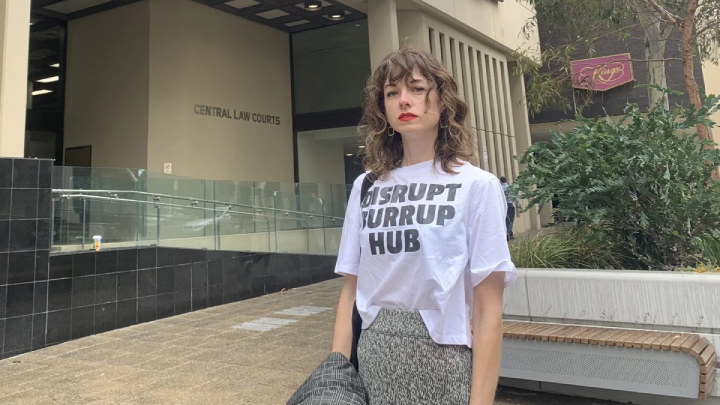
Sydney Criminal Lawyers spoke to Disrupt Burrup Hubs Joana Partyka, who currently works for Australian Greens Senator Jordan Steele-John, about why she’s taken this stand over her passwords, the framing of climate defenders as terrorists and how far down the track the crisis is.
Firstly, Joana, why did you make this brave decision to refuse to hand over your device passwords to police? And how are you feeling about being tried on charges of this nature, when all you have done is use guerilla theatre tactics in defence of climate?
The primary reason I refused to hand over my passwords was because I was concerned doing so would place me in breach of my employment contract and potentially result in my dismissal.
At the time, I was employed at the Australian Greens’ national office, and my contract explicitly prohibited me from providing access to any confidential party information to a third party.
As I used both my phone and laptop for work purposes, both devices contained information of a sensitive and confidential nature. I sought the advice of my manager who confirmed that giving the police access to my devices would for all intents and purposes place me in breach of my contract.
When the police were unable to provide me with information around how they would handle, store and secure the data stored on my devices, it became even clearer to me that the risk of complying with the data access orders far outweighed the risk of defying it.
I find it absolutely extraordinary that I’m being pursued to this degree for climate activism.
This is believed to be the first time a climate activist in Western Australia has faced trial on this specific charge – a charge that, as you point out, makes more sense in the context of something like terrorism or, well, any actual crime.
I haven’t actually been charged with anything pursuant to the search warrant that resulted in the seizure of my phone and laptop and subsequent data access orders.
To be honest, I’m pretty furious.
Following another nonviolent action DBH had planned, which was allegedly going to involve one young woman spray painting a message on the house of Woodside CEO Meg O’Neill’s suburban home, four DBH climate defenders have been placed on violence restraining orders (VROs), which are usually reserved for domestic violence issues.
Again, the protest action involved posed no violence. So, what do you think about the use of these orders on climate defenders? And are they affecting the subjects of the orders to the extent that they can’t publicly criticise Woodside anymore?
The use of these orders against peaceful climate protestors is frankly a gross misuse of a serious legal instrument designed to protect people from genuine acts or threats of violence.
It’s deeply disturbing that our judicial system – one we hold to be robust, honourable and impartial – could endorse such a patently inappropriate, undemocratic response.
None of the four campaigners who’ve been placed on these violence restraining orders had any intention of undertaking an act of violence against O’Neill, or anyone for that matter, ever.
None are accused – let alone charged – with any crime remotely approximating a violent one. Moreover, all four were already subject to strict bail conditions that prevented them from approaching O’Neill and her property, as well as Woodside property more generally.
The one point of difference between the existing protective bail conditions and the requirements of the VROs is a ban on speaking publicly about O’Neill and the 1st August incident outside her house.
The only reasonable conclusion, then, is that the VROs were explicitly sought as a means of gagging criticism of and silencing dissent against Woodside.
I can’t speak directly for the Disrupt Burrup Hub campaigners subject to the VROs nor their experiences, but of course, not being able to speak freely about Woodside’s activities is incredibly frustrating.
Like everyone in the campaign, they have real, urgent concerns about Woodside’s plans at Murujuga. Like everyone in what is supposed to be a democratic country, they have the right to voice those concerns.
Not only have those rights been stripped of them, but they’ve also been publicly and legally characterised as posing a threat so serious that a restraining order is necessary.
It’s quite a distressing outcome within a campaign that explicitly acts in defence of life.
Beyond these considerable individual ramifications on the campaigners in question, we must also consider the broader impact of the decision to issue VROs in this context.
As many legal experts around the country have tendered, it could set a dangerous precedent for such orders being sought against peaceful climate protestors in the future, and it could have a deleterious impact on free speech. The potential effects are truly chilling.
You’ve now been raided three times. But your treatment and that of the subjects of the VROs are not the only cases of Disrupt Burrup Hub activists being subjected to extremely prejudiced policing.
One young man had a plainclothes police officer jump out of an unmarked van and point his gun at him.
Can you describe what’s going on regarding DBH and the WA police? Why are climate defenders being treated like public enemy number one?
Western Australia is an extractive kingdom long ruled by the fossil fuel industry. Its dictatorship has not simply gone unchallenged – it is actively defended by the state.
In such a context, the work Disrupt Burrup Hub undertakes doesn’t just mean we’re treated like public enemy number one – as far as industry and the authorities are concerned, we are public enemy number one.
What we’re seeing play out is an unrepentant authoritarian fossil fuel villain exerting a disproportionate level of influence over our elected officials and the public institutions they administer.
In exchange for a comparatively meagre contribution to the coffers of the major parties, Woodside and companies like it receive open slather over policy that impacts their business and a protection racket in the form of WA police.
Disrupt Burrup Hub is the latest target of this racket because we’re threatening business as usual.
We’re successfully challenging public sentiment around a company that trades in death and destruction, which in turn challenges their ability to operate.
It’s fair to say that you could draw a direct line between Woodside’s diminishing social licence and Disrupt Burrup Hub’s sustained campaign to expose them for the climate criminals they are.
The tactics the authorities deploy against Disrupt Burrup Hub continue to escalate in direct proportion to Woodside’s growing desperation.
They can see their aggressive greenwashing isn’t working like it used to: the public is no longer accepting the fiction that they sponsor WA’s beloved cultural and sporting institutions because of a sense of corporate responsibility.
They’re not buying the spin that financial support of children’s learning centres comes from some heartwarming sense of community.
As Woodside finds itself running out of the tools it traditionally uses to fend off criticism, they’re simply throwing whatever they can at us and hoping it will stick.
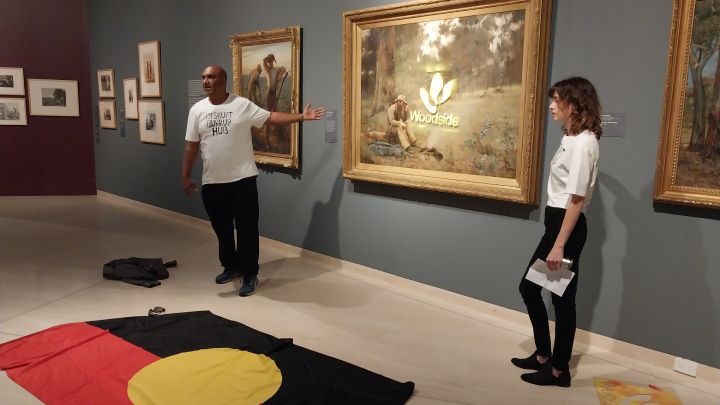
DBH is carrying out nonviolent direct actions that aim to draw attention to Burrup Hub a project that consists of gas and fertiliser plants, as well as gas fields off the northern WA coast. The project threatens the UNESCO-nominated Murujuga rock art site with its emissions.
The Hub includes the Scarborough gas project and there has been a significant win with that, as Woodside has just agreed to a temporary injunction to halt its plans to carry out seismic testing within the habitat of significant sea life.
So, how would you describe the reasons why Burrup Hub warrants the specific attention of your group? And how do you consider the current victory?
Woodside’s Burrup Hub stands to become Australia’s most polluting new fossil fuel project.
Over its 50 year lifetime, this megaproject is projected to pump out six billion tons of deadly carbon dioxide into the atmosphere.
That’s twelve times Australia’s current annual emissions, four times the emissions expected of Adani, and roughly equivalent to the emissions of 50,000 homes every single day until 2070.
It will singlehandedly destroy Australia’s ability to meet our international obligations on emissions reduction.
On top of the terrifying climate impacts, the Burrup Hub directly threatens the oldest and largest collection of Aboriginal rock art in the world.
The area known as Murujuga is deeply sacred to traditional custodians, as well as incredibly significant to humanity from an archaeological and historical perspective.
These are some of the many reasons the Burrup Hub does not stack up, but there is only one reason it’s still on the table: profit.
We are being pushed up against a wall to literally fight for our lives so people like Meg O’Neill can park Maseratis and lime green Jeeps in their driveways.
It is our moral obligation to stand up and say absolutely the fuck not.
The recent injunction against Woodside is a huge win for climate and culture. There are a number of significant material wins to note.
First and foremost is the staving off of cultural desecration but also in the authority of traditional custodians that the legal system has rightly acknowledged and upheld.
It’s also emerged that Woodside has sustained a financial blow as a result of the injunction – that’s important, because if anything will influence the industry to change track it’s material loss.
The injunction is also a real shot in the arm for the climate movement more broadly. In a more symbolic sense, it shows us that it’s possible to challenge a powerful corporate leviathan and win.
It shows us that they’re not totally above the law, and that the little guy is nowhere near as powerless as the system dupes us into believing.
Of course, DBH wants to see Burrup Hub shut down because of the massive contribution it is and will be making to global heating.
How do you consider the global climate crisis at present? Has it progressed beyond the point that it’s commonly understood to be in mainstream circles and media?
At the very least, the climate crisis has crossed over into mainstream acceptance: it’s no longer the subject of debate among reasonable people.
To say you don’t believe in climate change or that anthropogenic activities have served to escalate it will raise eyebrows in ways it never has before. That’s a win.
While I’m no climate scientist, I do think the scale of the crisis is beyond what many of us believe, and action to mitigate it is still not nearly close nor rapid enough to what’s needed.
It’s incredibly frustrating because we know exactly what the problem is, and we know exactly how to fix it – it’s that the people with access to the right tools aren’t interested in doing what needs to be done.
Equally frustrating and dangerous is climate doomerism. Mitigating warming is going to be hard – it is hard – but it’s not impossible.
And lastly, Joana, DBH is not the only group of climate defenders who’ve been hit hard in this nation by extreme laws, excessive bail conditions and time in prison. Internationally, people have been shot dead by authorities as they’ve been defending climate.
What are your thoughts about the WA demonisation of climate defenders and how does it relate to the broader agenda?
I’m not at all surprised that the WA authorities are throwing everything they can at trying to stamp out impactful climate activism and Disrupt Burrup Hub in particular, though the unprecedented lengths to which they’re going to are quite extraordinary.
They’re executing a very strategic campaign against us to undermine our anti-fossil message, employing tactics that purposefully serve to dehumanise and make pariahs of us.
For instance, both the authorities and media here in WA have started to bandy about the word “terrorism” in reference to Disrupt Burrup Hub.
In court recently, police prosecutors described a DBH action as a “form of terrorism”, while WA emergency services minister Stephen Dawson recently said in state parliament that he understands how “a fair-minded person” could deem the campaign as “an act of terrorism”.
As far as I’m concerned, weaponising that kind of language against peaceful protestors is far more dangerous than any activity Disrupt Burrup Hub is engaged in.
Climate defenders in WA are not in fear for our actual lives – the rapidly unravelling climate crisis aside – and it’s, of course, horrifying that people in other parts of the world are killed for doing what we do.
But I refuse to accept the bare minimum – not being murdered by my government – as something we should be grateful for.
We have a right to make our views heard in a peaceful manner, and we will not apologise for that.
If there was any doubt before, it’s now unequivocal who WA authorities are interested in protecting.
I have no doubt they will ramp up their assault on climate protesters as we continue to escalate our campaign to bring down the industry they’re deployed to protect.
No matter what happens, I know Disrupt Burrup Hub is on the right side of history.


